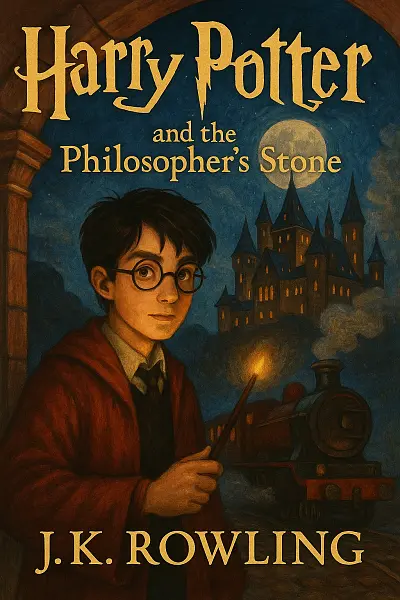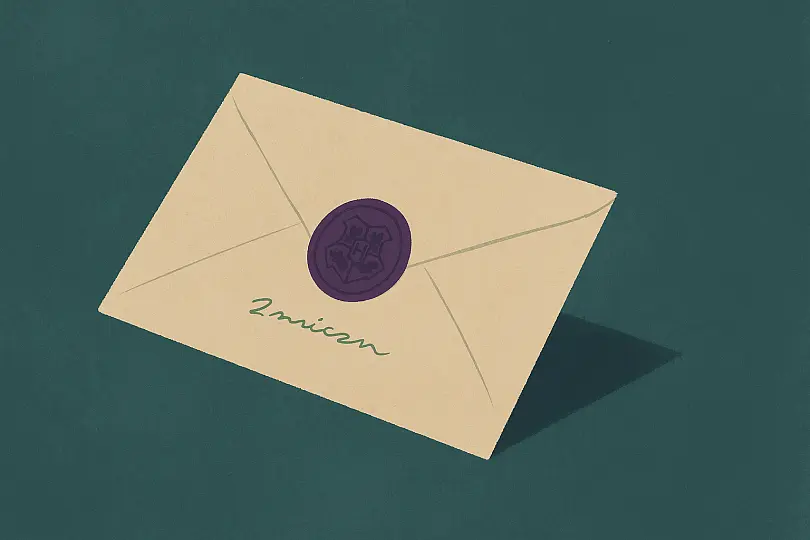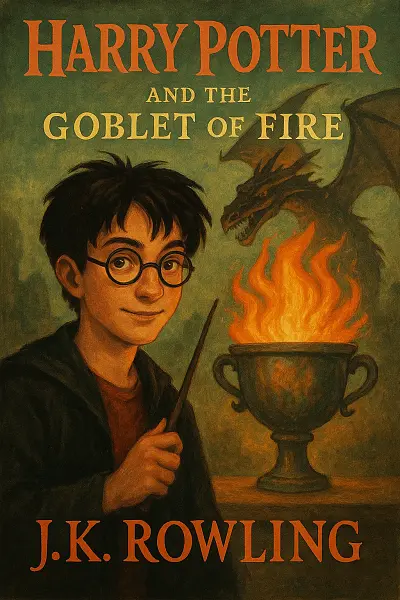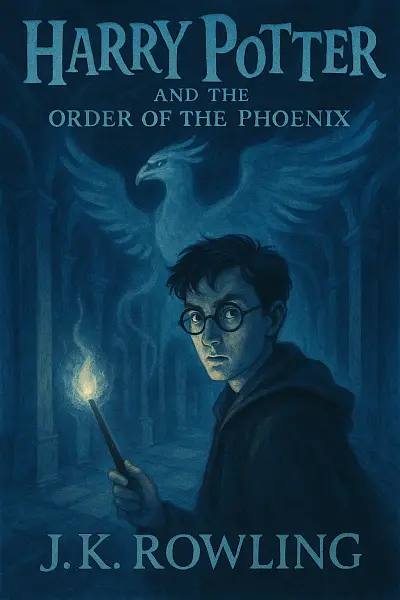
Harry Potter and the Philosopher’s Stone
by: J.K. Rowling
Harry Potter lives a dreary life with the Dursleys, feeling hopelessly out of place and unwanted in the drab world of Privet Drive. Everything changes when a mysterious letter—long suppressed by his aunt and uncle—finally reaches him.
Suddenly, Harry’s invited to Hogwarts School of Witchcraft and Wizardry, and his wildest dreams—and deepest fears—come true. Thrust into a realm bursting with magic, friendships, and hidden dangers, Harry must navigate school rivalries and unravel the enigma of a powerful, coveted stone.
With each discovery, the danger grows and Harry’s loyalty, bravery, and sense of belonging are put on the line. Will he find his true place—or lose everything? The story radiates warmth, whimsy, and a sense of thrilling possibility.
""Courage is not found in the absence of fear, but in the quiet decision to stand for what is right, even when the world is watching.""
Let's Break This Down
The Author's Voice
Atmosphere
Step into a world where wonder hangs in the air and the ordinary is just a thin veil hiding the extraordinary. Rowling conjures a vivid, enchanting sense of place—think candlelit halls, moving staircases, and bustling magical marketplaces. The mood effortlessly shifts from whimsical to suspenseful, keeping readers teetering between comfort and anticipation. Expect a blend of cozy British charm, irresistible fantasy, and just the right touches of darkness.
Prose Style
Rowling’s writing sparkles with clarity and warmth. Her sentences are brisk and inviting, peppered with clever humor, playful dialogue, and the occasional burst of poetic description. She’s a master at weaving in details that bring scenes to life without bogging down the pace. The vocabulary is accessible but flavorful—not too simple for adults, but perfect for younger readers diving into their first big fantasy.
Pacing
Get ready for a story that moves with infectious energy. Rowling draws you in instantly and whisks you along from the mundane to the magical with never a dull moment. Chapters end on little cliffhangers, making it almost impossible to stop reading “just one more.” There’s a delightful rhythmic balance between moments of high adventure, quieter character scenes, and laugh-out-loud school shenanigans.
Dialogue & Character Voice
Every character—no matter how minor—pops with personality. Dialogue is snappy, distinct, and genuinely funny, capturing British wit and the nervy excitement of youngsters discovering their place in a vast new world. Characters’ voices remain authentic and consistent, letting friendships and rivalries feel totally real.
World-Building
This isn’t just a story, it’s a universe waiting to be explored. Rowling slips world-building effortlessly into the narrative, inviting readers to discover magical customs, sports, and creatures right alongside Harry. Rule systems and traditions feel real and lived-in, never info-dumped, always earned through discovery and delight.
Overall Mood & Rhythm
Expect a pitch-perfect blend of light and shade. There’s innocence and sparkle but also an undercurrent of danger and mystery that adds delicious tension. The book is both a comfort read and a page-turner, radiating warm nostalgia while setting your imagination alight.
Key Moments
-
“Yer a wizard, Harry” – the gateway to an unforgettable magical world
-
The Sorting Hat’s quirky wisdom sets the tone for brave and messy friendships
-
Mischief in the midnight corridors: invisibility cloak escapades and heart-thudding close calls
-
Quirrell’s shocking reveal – betrayal hidden behind a timid stutter
-
Dumbledore’s gentle wisdom: magic, morality, and the power of choices
-
Chocolate Frogs and moving portraits – Hogwarts feels like it’s breathing around you
-
Golden Trio’s loyalty tested in a deadly chess match – brains, bravery, and teamwork unite
Plot Summary
Harry Potter, an orphan mistreated by his relatives, the Dursleys, discovers on his eleventh birthday that he is a wizard. Welcomed into the magical world, Harry attends Hogwarts School of Witchcraft and Wizardry, where he befriends Ron Weasley and Hermione Granger. As the trio unravels mysteries surrounding a hidden object—the Philosopher’s Stone—they confront challenges involving magical creatures, logic puzzles, and dark magic. The climax builds to Harry facing Professor Quirrell, who is possessed by Lord Voldemort, in an attempt to seize the Stone and return to power. With courage and the help of his friends, Harry protects the Stone, prevents Voldemort’s return, and ends his first year at Hogwarts having truly found belonging for the first time.
Character Analysis
Harry Potter starts as an unloved, isolated child but gradually grows into a courageous, loyal friend who embraces his newfound identity and self-worth. Hermione Granger evolves from a rule-abiding know-it-all to a true friend who values bravery and teamwork over book knowledge alone. Ron Weasley provides both humor and steadfast support, often overcoming his insecurities to help his friends prevail. Professor Dumbledore serves as the wise mentor, subtly guiding Harry and encouraging his moral development, while Draco Malfoy and Professor Snape act as antagonists who challenge and define Harry’s values.
Major Themes
One central theme is the power of love—Harry’s mother’s sacrifice protects him from Voldemort, highlighting love’s enduring impact. Friendship and loyalty shine throughout the story, especially as Harry, Ron, and Hermione risk everything for each other and the greater good. Identity and belonging are also key: Harry’s journey is not just magical but personal, as he finds family and purpose at Hogwarts. The theme of good vs. evil is encapsulated by the struggle to protect the Stone and oppose Voldemort, making moral choices even when the stakes are high.
Literary Techniques & Style
J.K. Rowling’s writing is marked by vivid world-building, brisk pacing, and whimsical humor that keeps the tone lively even in tense moments. She uses third-person limited narration from Harry’s perspective, inviting readers to discover the magical world alongside him. Symbolism abounds—the Mirror of Erised reveals characters’ deepest desires, while the Philosopher’s Stone represents the pursuit of immortality and the cost of greed. Rowling also peppers the narrative with foreshadowing, clever metaphors, and misdirection, keeping readers engaged and invested in the unfolding mysteries.
Historical/Cultural Context
Set in 1990s Britain, the novel reflects aspects of British boarding school culture and society’s fascination with the supernatural. Rowling’s creation draws upon folklore, mythology, and British traditions to shape her magical world. Themes of prejudice and class, seen in blood status and family reputation, parallel real-world issues, subtly inviting readers to interrogate their own cultural assumptions.
Critical Significance & Impact
Harry Potter and the Philosopher’s Stone is widely credited with reinvigorating children’s literature, sparking a global phenomenon and influencing an entire generation of readers and writers. Its blend of adventure, fantasy, and universal coming-of-age themes has led to lasting popularity and critical acclaim. The novel’s immense success paved the way for seven sequels, a film franchise, and a renewed interest in stories that celebrate courage, friendship, and the power of imagination.

An orphan discovers magic—and himself—at a school full of secrets.
What Readers Are Saying
Right for You If
If you’re curious about Harry Potter and the Philosopher’s Stone and wondering if it’s worth picking up, here’s the lowdown:
- You’re gonna love this if…
- You adore getting swept away in magical worlds full of quirky details, secret passageways, and whimsical creatures.
- Coming-of-age stories are your jam and you root for plucky underdogs – Harry’s journey from dull, everyday life to discovering he’s a wizard totally delivers that sweet wish-fulfillment.
- You’re a fan of classic good-vs-evil tales with a comfortingly cozy, British boarding school twist.
- You like your characters endearing, the plot packed with mysterious puzzles, and plenty of lighthearted humor woven in.
- Honestly, this one’s basically a warm cup of tea for fans of fantasy, so if you’ve enjoyed things like Percy Jackson, Narnia, or even The Worst Witch, you’ll be right at home.
- It’s perfect for younger readers (like ages 8 and up), but just as magical if you’re a nostalgic adult or someone dipping toes into fantasy for the first time.
- Might not click for you if…
- You prefer gritty or super realistic stories – this one’s pure escapism with a heavy dose of wonder, not hard-hitting realism.
- Dense, philosophical reads or super edgy thrillers are more your style – this skews lighter, especially in the first book.
- If you’re not into stories where kids take center stage, or you roll your eyes at magical school tropes, you might find it a bit too cutesy or predictable.
- Folks who need lightning-fast pacing or non-stop action might feel like the world-building slows things down in the beginning.
- And, heads up: if you’ve somehow managed to dodge all things Harry Potter and have zero interest in wizards, magic, or the idea of hidden magical societies – honestly, you’ll probably just be frustrated.
Bottom line? If you’re craving a charming, whimsical escape with heart, memorable friendships, and that special sense of “anything-can-happen” magic, absolutely give it a go. If you’re looking for hard-boiled drama or uncompromising realism, maybe put this one on the back burner.
What You're Getting Into
Get ready for magic, mystery, and mischief!
Harry Potter and the Philosopher’s Stone launches you into the enchanting world of Hogwarts, where an ordinary boy discovers he’s anything but ordinary.
-
Thrust into a hidden world of wizards and magical creatures, Harry makes new friends, faces unexpected challenges, and starts to unravel secrets about his own past.
-
The story sparkles with adventure, friendship, and a touch of danger—as Harry and his classmates navigate the wonders and perils of their new world!
-
If you’re hooked by stories of found family, magical schools, and unforgettable characters, this book is pure, page-turning delight.
Characters You'll Meet
-
Harry Potter: The earnest, courageous young wizard discovering his magical heritage. His journey from neglected orphan to hero is the heart of the story.
-
Hermione Granger: Brilliant and determined, Hermione is the brains of the trio, often saving the day with her quick thinking and deep knowledge.
-
Ron Weasley: Loyal and good-hearted, Ron stands by Harry’s side through every challenge, providing humor, warmth, and steadfast support.
-
Albus Dumbledore: Wise and enigmatic headmaster of Hogwarts, Dumbledore guides Harry with subtle lessons and a comforting presence.
-
Draco Malfoy: Harry’s rival at Hogwarts, Draco embodies the privileged, antagonistic student, challenging Harry and adding tension throughout their first year.
More Like This
Stepping into the halls of Hogwarts in Harry Potter and the Philosopher’s Stone feels a bit like discovering a portal in The Lion, the Witch and the Wardrobe—both plunge you suddenly into a world where ordinary children are swept into magical destinies, encountering friends, formidable foes, and fantastical creatures along the way. Rowling's blend of adventure, heart, and hidden mysteries will definitely resonate with fans who found themselves rooting for the Pevensies as much as they do for Harry and his friends.
If you're a fan of modern magical coming-of-age stories, Percy Jackson & The Olympians: The Lightning Thief delivers a similar mix of quirky school settings, mythic dangers lurking in plain sight, and a young hero discovering his legacy. Rowling and Riordan both excel at weaving relatable adolescent struggles with epic quests, making each chapter a page-turner packed with humor and suspense.
On the big screen, the whimsical, hidden-wizardry vibe and British boarding school charm echo the playful mischief and camaraderie of Matilda—especially in the way unlikely youngsters use wit and bravery to challenge the rules of their world. Whether you grew up loving tales of magical misfits, secret passageways, or underdogs toppling the odds, stepping into Harry’s shoes might just recapture that same sense of awe and possibility.
Critic's Corner
What makes a home, or a family, and how do we remake our identities when thrust into the unknown? Harry Potter and the Philosopher’s Stone dares readers to wonder: in a world brimming with everyday magic, is the truest enchantment the chance to rewrite our own stories? J.K. Rowling’s debut doesn’t just introduce a universe of spells and fantastic creatures—it probes what it means to belong, to be chosen, and to choose bravery when it matters most.
Rowling’s style is deceptively simple: her prose flows with easy confidence—chatty, yet vivid, evoking everyday English humor while tinging the mundane with the marvelous. The third-person, limited perspective cleverly grounds fantastical events through Harry’s naive gaze, allowing readers to discover Hogwarts with genuine, wide-eyed wonder. Rowling’s talent lies in her economical world-building: details like the raucous feasts and shifting staircases are conjured in a handful of precise, playful lines. Dialogue sparkles with a distinctly British wit, and even minor characters receive memorable, idiosyncratic touches (consider the bumbling, gentle presence of Hagrid, or the crisp menace of Professor McGonagall). Pacing rarely flags—except, perhaps, in early domestic scenes at Privet Drive, which risk repetition—but Rowling’s narrative drive surges whenever Harry enters the magical landscape.
At its core, the novel grapples with courage, friendship, and the enduring scars of loss. Rowling doesn’t flinch from life’s harshness—Harry’s orphaned status, the cruelty of the Dursleys, the specter of a broken family—yet she champions resilience and compassion as the greatest forms of magic. Hogwarts itself glistens as a microcosm of society: hierarchies, prejudices, and shifting allegiances mirror real-world dynamics, making Harry’s journey universally resonant. In this way, the book offers both escapism and critique—probing themes of identity, class, and belonging while celebrating the transformative power of loyalty and kindness. The persistent dichotomy of light and darkness, good and evil, feels archetypal but never simplistic; even antagonists are painted with ambiguous, sometimes poignant motivations. The narrative invites readers of any age to reflect on what shapes character: innate gifts, difficult choices, or the bonds we forge along the way.
Rowling’s work revitalized modern fantasy, echoing the grand tradition of Tolkien and Lewis, yet made distinctly her own with sharp humor and a contemporary setting. The whimsical, detail-rich world mingles the extraordinary with the everyday, giving reluctant readers a welcoming entry point. Philosopher’s Stone stands apart from later volumes by its fairytale innocence and contained stakes—offering a kind of nostalgic comfort that few series openers achieve. Within children’s literature, it inaugurated a new golden age, reshaping publishing trends and genre expectations.
Not every spell lands perfectly—side characters can occasionally veer toward caricature, and the moral framework, while sturdy, is sometimes baldly drawn. Yet the book’s emotional clarity, inventive spirit, and undiminished sense of wonder make it an enduring classic. Philosopher’s Stone reminds us why stories matter: they help us find magic in the ordinary and courage in ourselves.
Community Thoughts
okay but did anyone else just sit up in bed for hours after the mirror of erised scene? harry seeing his family felt like a punch to the heart, i couldn't stop thinking about it, legit messed up my sleep for days
I can’t get over the way Hermione corrected Ron’s spell in the first lesson. It was like watching my older sister school me at chess, impossible to ignore and kind of inspiring but also infuriating.
ok but can we talk about how the mirror of erised scene basically cracked open my brain? harry seeing his parents for the first time in that glass, i literally could not sleep, it just haunted me for days.
that scene where harry finds the mirror of erised and sees his parents absolutely broke me. the longing in that moment is so real, it stayed with me for days. i kept thinking about what i would see in that mirror.
woke up at 3am thinking about the Mirror of Erised. harry's longing for family hit so hard it was almost too much. couldn't stop picturing the reflections, even with the lights on. still gives me chills.
Leave Your Review
Local Take
Why It Matters
Harry Potter and the Philosopher’s Stone finds a special resonance in India’s diverse cultural landscape!
-
Sense of Community & Family: Just like Indian values emphasize family bonds and loyalty, the warmth of the Weasleys and Harry’s yearning for belonging strike an emotional chord. The classic battle of “chosen family” versus biological family fits into many local coming-of-age stories.
-
Class Struggles & Social Mobility: The divide between Muggle-borns and pure-blood wizards reflects the lingering realities of caste and social hierarchy in India. Harry’s journey from a neglected underdog to a celebrated hero mirrors the aspirational ethos many cherish here.
-
Parallels to Partition & History: The shadow of Voldemort’s rise—an era of fear, suspicion, and the wrestling with divided identities—evokes memories of India’s own historical upheavals and partition trauma.
-
Mythology & Magic: The storytelling echoes Indian literary tradition, blending fantastical elements with everyday school life, much like tales from Amar Chitra Katha or ancient epics where ordinary children stumble into the extraordinary.
No wonder Indian readers feel that blend of nostalgia, possibility, and cultural déjà vu!
Food for Thought
Controversies:
Some critics have claimed the series promotes witchcraft and the occult, leading to book bans in schools and libraries, while others have debated J.K. Rowling's personal views and public statements, which have sparked ongoing cultural and social discussions.
Like what you see? Share it with other readers







